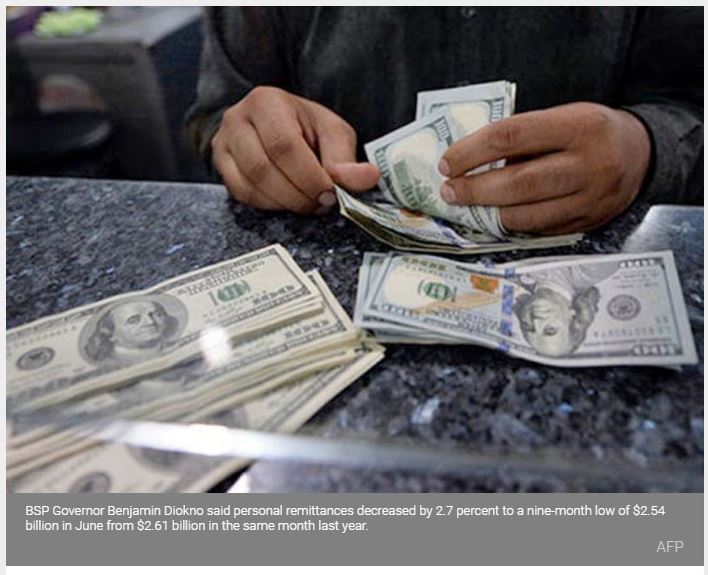Philippines: Remittances slip to 9-month low in June
MANILA, Philippines — Dollar remittances from Filipinos working abroad declined in June after increasing for nine straight months, the Bangko Sentral ng Pilipinas (BSP) reported yesterday.
BSP Governor Benjamin Diokno said personal remittances decreased by 2.7 percent to a nine-month low of $2.54 billion in June from $2.61 billion in the same month last year.
The amount of personal remittances was the lowest since the $2.49 billion recorded in September last year.
For the first half, Diokno said personal remittances composed of cash and non-cash items that flow through both formal or via electronic wire and informal channels such as money or goods carried across borders rose by only 2.9 percent to $16.25 billion from $15.79 billion in the same period last year.
Diokno said personal remittances from land-based workers with contracts of one year or more inched up by 1.8 percent to $12.4 billion, while remittances from sea-and land-based workers with short-term contracts went up by 8.8 percent to $3.5 billion.
Diokno said cash remittances coursed through banks also slipped by 2.9 percent to a nine-month low of $2.29 billion in June from $2.36 billion in the same month last year.
This was the lowest since the $2.24 billion booked in September last year.
“This was attributed to the 5.4 percent year-on-year drop in cash remittances from land-based workers, which was mitigated by the 6.3 percent increase year-on-year from sea-based workers,” he said.
The BSP chief said countries that contributed to the decline in June were Saudi Arabia and Qatar.
Despite the decline, Diokno said cash remittances still went up by 3.2 percent to $14.64 billion in the first semester from $14.18 billion in the same period last year.
During the period, cash remittances sent by land-based workers inched up by 1.8 percent to $11.4 billion, while transfers from sea-based workers went up by 8.7 percent to $3.2 billion.
According to Diokno, the US registered the highest share of overall remittances in the first half with a share of 36.4 percent followed by Saudi Arabia, Singapore, United Arab Emirates, the United Kingdom, Japan, Canada, Hong Kong, Germany and Qatar.
“The combined remittances from these countries accounted for 78 percent of the total cash remittances from January to June,” Diokno said.
The BSP has retained the growth target for both personal and cash remittances at three percent for this year.
Remittances usually fuel personal consumption helping sustain a steady economic growth. The amount of money sent home by overseas Filipinos usually account for 10 percent of gross domestic product (GDP).
Strong inflows from remittances, earnings of the business process outsourcing (BPO) sector as well as tourism receipts continued to boost the peso that recovered strongly late last year.
The peso has been broadly stable after emerging as the third worst performing currency in the region, shedding 5.4 percent to end at 52.58 to $1 last year from 49.93 to $1 in 2017.
It strengthened to pierce the 50 to $1 level but has weakened since then, returning to the 52 to $1 level due to the worsening trade war between the US and China as well as the depreciation of the Chinese yuan.
Source: https://www.philstar.com/business/2019/08/16/1943680/remittances-slip-9-month-low-june#jKCzE2BYmSh6GV9t.99


 English
English




